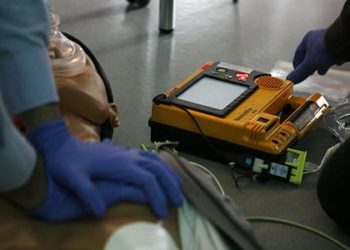Mechanical CPR provides no benefit over manual CPR [PARAMEDIC trial]
1. No evidence of improvement in 30-day survival was found with use of LUCAS-2 mechanical compression versus manual compression for cardiopulmonary resuscitation (CPR) of cardiac arrest victims outside of a hospital.
2. Health systems must evaluate the benefit of introducing LUCAS-2 technology into emergency vehicles, weighing the price of the technology and training for situations in which providing manual CPR in a moving vehicle may endanger the provider.
Evidence Rating Level: 1 (Excellent)
Study Rundown: As few as one in 12 patients who suffer cardiac arrest outside of a hospital survive. CPR depends on high-quality chest compressions that can be difficult even under ideal circumstances. Mechanical chest compression devices may hold benefit over manual cardiopulmonary resuscitation (CPR), but there is little supporting evidence. This study assessed whether LUCAS-2, a mechanical chest compression device, improved 30-day survival in adults suffering out-of-hospital cardiac arrest compared to manual CPR. This study was conducted under real-life circumstances in which performing manual CPR may be difficult or dangerous for personnel, such as in a moving vehicle. The primary outcome was survival at 30 days and was analyzed by intention to treat. No significant improvement of 30-day survival was noted with LUCAS-2 compared to manual compression. LUCAS-2 technology and training is more expensive than that of manual compressions, but providing manual compressions in moving vehicles may be dangerous. Health systems must weigh the cost of technology vs. the danger to personnel of providing manual compressions in a moving vehicle. This study is the first randomized trial using LUCAS-2, providing important initial data. The quality of CPR provided was limited by scarcity of CPR-monitoring technology.
This study was funded by the National Institute for Health Research HTA.
Click to read the study, published today in The Lancet
Relevant Reading: Transport with ongoing resuscitation: a comparison between manual and mechanical compression
In-Depth [randomized controlled trial]: This study assessed 30-day survival for adults suffering cardiac arrest outside of a hospital who received either mechanical compression with LUCAS-2 (experimental group) or manual compression (control group). 30-day survival after cardiac arrest was chosen as the primary endpoint because most mortality occurs within 30 days after cardiac arrest. 418 emergency response vehicles were recruited for participation and were randomly assigned (1:2) to provide compressions using LUCAS-2 (147 vehicles) or manual compressions (271 vehicles) according to standard training guidelines. 4, 471 patients were eligible for CPR, with 1,652 assigned to the LUCAS-2 group and 2,819 assigned to the manual compression group. Patients were assigned to the LUCAS-2 group or manual compression group according to the first vehicle to arrive on scene. 985 (65%) of patients in the LUCAS-2 group actually received mechanical chest compression and 11 (1%) of patients in the manual compression group received LUCAS-2. No significant difference was found in 30-day survival between the LUCAS-2 group and the manual compression group (104 [6%] of patients in the LUCAS-2 group, 193 [7%] of patients in the manual compression group, adjusted odds ratio 0.86 [95% confidence interval, (CI), 0.64-1.15]. Secondary endpoints of 3-month survival, 12-month survival, and survived event (return of spontaneous circulation until admission to receiving hospital) were similar to that of 30-day survival, and did not favor LUCAS-2.
More from this author: Group B streptococcus infections on the rise despite prevention guidelines, Transplanted stem cells help restore sight in age-related macular degeneration, Quality of life measures similar between teens with and without cerebral palsy, Long working hours linked with diabetes in low socioeconomic groups, Thoracic radiotherapy improves survival in small-cell lung cancer patients
Image: CC/Wiki/Heilman
©2014 2 Minute Medicine, Inc. All rights reserved. No works may be reproduced without expressed written consent from 2 Minute Medicine, Inc. No article should be construed as medical advice and is not intended as such by the authors, editors, staff or by 2 Minute Medicine, Inc.




![[CORAL-1 trial] Interferon-free regimen for recurrent hepatitis C after liver transplant safe and effective](https://www.2minutemedicine.com/wp-content/uploads/2014/11/10229_lores-75x75.jpg)

